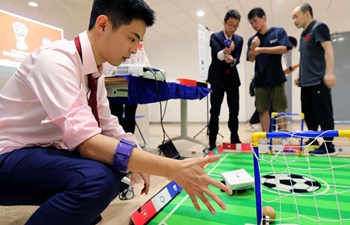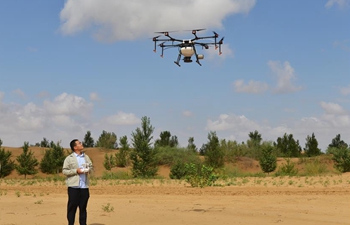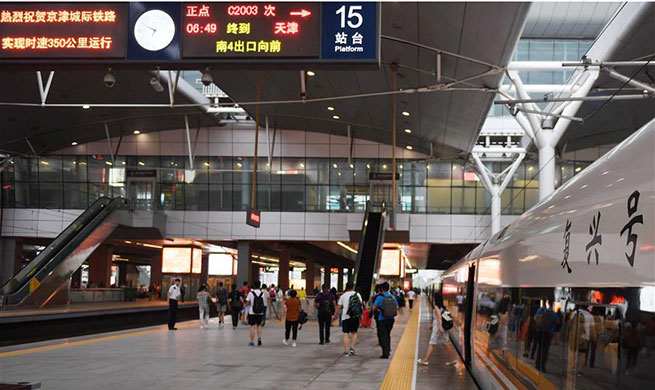BEIJING, Aug. 8 (Xinhua) -- The international community has widely criticized Washington following U.S. President Donald Trump's withdrawal from a major nuclear pact and resumption of sanctions on Iran.
Trump said Tuesday that anyone doing business with Iran will not be allowed to maintain business ties with the United States.
Trump tweeted that "the Iran sanctions have officially been cast. These are the most biting sanctions ever imposed, and in November they ratchet up to yet another level."
Despite the global outcry, Trump withdrew from the Joint Comprehensive Plan of Action (JCPOA) and on Tuesday the first batch of the re-imposed U.S. sanctions on Iran, which had been lifted under the deal, came into full effect.
These U.S. actions target Tehran's purchase of U.S. banknotes, trade in gold and other precious metals, as well as the use of graphite, aluminum, steel, coal, and software used in industrial processes.
Another round of sanctions, to be reinstalled on Nov. 5, will be on Iran's port, energy, shipping and ship-building sectors, its petroleum-related transactions, and business deals by foreign financial institutions with the Central Bank of Iran.
In response to Trump's order to reinstate the sanctions, Iranian President Hassan Rouhani said that the Iranians would make the United States regret its actions.
"Through unity and solidarity, the Iranians will weather away the return of sanctions," Rouhani said. "Trump will learn that these kinds of pressures did not surrender Iranians in the past and will never do so in the future."
UN spokesman Farhan Haq said that the United Nations continues to encourage support from all governments for the JCPOA.
"The secretary-general has, himself, repeatedly discussed the importance of the Joint Comprehensive Plan of Action as one of the key diplomatic achievements of recent years. He believes that it deserves continued support and that all of the parties to that agreement need to abide by its terms," spokesman Farhan Haq said.
In response to concerns of possible humanitarian impact of the sanctions, Haq said "we will have to see what the effects of these measures are," while stressing "regardless of the steps that are being taken," it is important that "Iran and the other parties comply with the terms of the Joint Comprehensive Plan Of Action."
British Defense Secretary Gavin Williamson said Tuesday that the current JCPOA was the "best possible" and "achievable" deal to address the West's concerns on Iran, in sharp contrast with Trump's abhorrence of the deal.
"On the Iran deal, we really encourage the United States along with all nations to get around the table and start discussing about actually ... how we have something that can work," Williamson said. "We really just encourage the United States to start talking to its partners and Iran in order to be able to find a route forward."
Hours before Trump's announcement to re-sanction Iran, the European Union (EU), Britain, France and Germany said in a joint statement that they would maintain economic ties with Tehran, and "are determined to protect European economic operators engaged in legitimate business with Iran."
They also said that "the European Union's updated Blocking Statute enters into force on Aug. 7 to protect EU companies doing legitimate business with Iran from the impact of U.S. extra-territorial sanctions."
Guenther Oettinger, German Christian Democratic Union (CDU) politician and EU commissioner, said that Germany's savings banks and credit unions could become a potential solution for companies to continue to do business with the Middle Eastern country and bypass U.S. sanctions.
Oettinger said that the regionally based and decentralized financial sector traditionally has few ties to U.S. financial markets and was hence less likely to be hit by the new sanctions regime.
Russian Foreign Ministry on Tuesday condemned Washington, saying that Russia would do everything to preserve and fully implement the Iran nuclear deal, which is under threat by U.S. unilateral sanctions.
"We condemn any unilateral sanctions in circumvention of the decisions of the UN Security Council, especially when they have extraterritorial application and affect the interests of third countries," the Russian ministry said.
As the U.S. move also puts Turkey in a tight situation, the Turkish foreign ministry said authorities are working to avoid the U.S. sanctions from harming Turkey.
"We do not have to adhere to the sanctions imposed on a country by another country. We don't find the sanctions right either," Turkish Foreign Minister Mevlut Cavusoglu said.
The Syrian Foreign Ministry condemned Washington as well, saying that Syria supports Iran in the face of the "aggressive" U.S. policies.
The ministry said the sanctions were "unilateral and illegitimate measures that come to confirm the tendency of hegemony and arrogance of the policies of the U.S. administration after losing credibility upon withdrawing from the Iranian nuclear deal."
Chinese State Councilor and Foreign Minister Wang Yi said in Singapore on Friday that China is willing to work with all parties to continue safeguarding the Iran nuclear deal.
"China always holds the view that JCPOA is a multilateral deal which is verified and approved by the Untied Nations Security Council and accords the common interests of all parties and the international community, which must be respected and safeguarded so as to maintain the authority of the United Nations, the effectiveness of multilateral deals and the credibility of the international rules," Wang said while meeting with Iranian Foreign Minister Mohammad Javad Zarif on the sidelines of the Association of Southeast Asian Nations (ASEAN) foreign ministers' meeting and related meetings.
In 2015, Iran and five permanent members of the UN Security Council- Britain, China, France, Russia and the United States - plus Germany, signed the nuclear deal in Vienna. Under the accord, Iran agreed to limit its sensitive nuclear activities and allow international inspections in return for the lifting of crippling economic sanctions.
(Xinhua reporters Zhu Dongyang and Guo Yina in Washington, William M. Reilly and Xu Xiaolei in New York, Qin Yanyang in Ankara, Moritz Rommerskirchen and Ren Ke in Berlin, Nathan Morley in Brussels, and Liao Bingqing in Moscow contributed to this story.)












